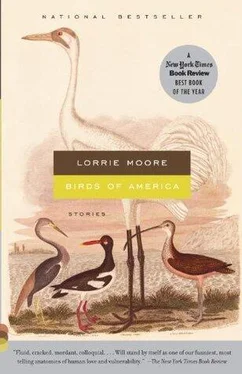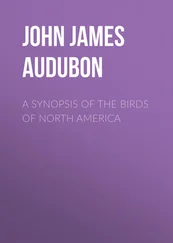“Yes,” said Ruth. Even the FOR SALE sign had sprouted a shock of dandelions at its base. “Unlike chocolates, houses are predictable: you always know you’re getting rot and decay and a long, tough mortgage. Eat them or put them back in the box — you can’t do either without a lawsuit or an ordinance hearing.”
“I don’t know what you’re talking about,” said Terence. He took Ruth aside.
“This is it,” he hissed. “This is our dream house.”
“ Dream house?” All the dreams she’d been having were about death — its blurry pixilation, its movement through a dark, soft sleep to a hard, bright end.
“I’m surprised you can’t see it,” said Terence, visibly frustrated.
She squinted again toward the soffits, the Picasso porch, the roof mottled with moss and soot. She studied the geese and the goose poop, moist, mashed cigars of which littered the stony shore of the pond. “Ah, maybe,” she said. “Maybe yes. I think I’m beginning to see it. Who owns it again?”
“A Canadian. He’s been renting it out. It’s a nice neighborhood. Near a nature conservatory and the zoo.”
“The zoo?”
Ruth thought about this. They would have to hire a lot of people, of course. It would be like running a company to get this thing back in shape, bossing everybody around, monitoring the loans and payments. She sighed. Such entrepreneurial spirit did not run in her family. It was not native to her. She came from a long line of teachers and ministers — employees. Hopeless people. People with faith but no hope. There was not one successful small business anywhere in her genes. “I’m starting to see the whole thing,” she said.
On the other side of town, where other people lived, a man named Noel and a woman named Nitchka were in an apartment, in the kitchen, having a discussion about music. The woman said, “So you know nothing at all? Not a single song?”
“I don’t think so,” said Noel. Why was this a problem for her? It wasn’t a problem for him. So he didn’t know any songs. He had always been willing to let her know more than he did; it didn’t bother him, until it bothered her.
“Noel, what kind of upbringing did you have, anyway?” He knew she felt he had been deprived and that he should feel angry about it. But he did! He did feel angry about it! “Didn’t your parents ever sing songs to you?” she asked. “Can’t you even sing one single song by heart? Sing a song. Just any song.”
“Like what?”
“If there was a gun to your head, what song would you sing?”
“I don’t know!” he shouted, and threw a chair across the room. They hadn’t had sex in two months.
“Is it that you don’t even know the name of a song?”
At night, every night, they just lay there with their magazines and Tylenol PM and then, often with the lights still on, were whisked quickly down into their own separate worlds of sleep — his filled with lots of whirling trees and antique flying machines and bouquets of ferns. He had no idea why.
“I know the name of a song,” he said.
“What song?”
“ ‘Open the Door, Richard.’ ”
“What kind of song is that?”
It was a song his friend Richard’s mother would sing when he was twelve and he and Richard were locked in the bedroom, flipping madly through magazines: Breasts and the Rest, Tight Tushies , and Lollapalooza Ladies . But it was a real song, which still existed — though you couldn’t find those magazines anymore. Noel had looked.
“See? I know a song that you don’t!” he exclaimed.
“Is this a song of spiritual significance to you?”
“Yup, it really is.” He picked up a rubber band from the counter, stretched it between his fingers, and released it. It hit her in the chin. “Sorry. That was an accident,” he said.
“Something is deeply missing in you!” Nitchka shouted, and stormed out of the apartment for a walk.
Noel sank back against the refrigerator. He could see his own reflection in the window over the sink. It was dim and translucent, and a long twisted cobweb outside, caught on the eaves, swung back and forth across his face like a noose. He looked crazy and ill — but with just a smidgen of charisma! “If there was a gun to your head,” he said to the reflection, “what song would you sing?”
· · ·
Ruth wondered whether she really needed a project this badly. A diversion. A resurrection. An undertaking. Their daughter, Mitzy, grown and gone — was the whole empty nest thing such a crisis that they would devote the rest of their days to this mortician’s delight? Was it that horribly, echoey quiet and nothing-nothing not to have Mitzy and her struggles furnishing their lives? Was it so bad no longer to have a daughter’s frustrated artistic temperament bleeding daily on the carpet of their brains? Mitzy, dear Mitzy, was a dancer. All those ballet and tap lessons as a child — she wasn’t supposed to have taken them seriously! They had been intended as middle-class irony and window dressing — you weren’t actually supposed to become a dancer. But Mitzy had. Despite that she was the fattest in the troupe every time, never belonging, rejected from every important company, until one day a young director saw how beautifully, soulfully she danced—“How beautifully the fat girl dances!”—and ushered her past the corps, set her center stage, and made her a star. Now she traveled the world over and was the darling of the critics. “Size fourteen, yet!” crowed one reviewer. “It is a miracle to see!” She had become a triumph of feet over heft, spirit over matter, matter over doesn’t-matter, a figure of immortality, a big fat angel really, and she had “many, many homosexual fans,” as Terence put it. As a result, she now rarely came home. Ruth sometimes got postcards, but Ruth hated postcards — so careless and cheap, especially from this new angel of dance writing to her own sick mother. But that was the way with children.
Once, over a year and a half ago, Mitzy had come home, but it was only for two weeks — during Ruth’s chemotherapy. Mitzy was, as usual, in a state of crisis. “Sure they like my work,” she wailed as Ruth adjusted that first itchy acrylic wig, the one that used to scare people. “But do they like me ?” Mitzy was an only child, so it was natural that her first bout of sibling rivalry would be with her own work. When Ruth suggested as much, Mitzy gave her a withering look accompanied by a snorting noise, and after that, with a cocked eyebrow and a wince of a gaze, Mitzy began monopolizing the telephone with moving and travel plans. “You seem to be doing extremely well , Mom,” she said, looking over her shoulder, jotting things down. Then she’d fled.
At first Terence, even more than she, seemed enlivened by the prospect of new real estate. The simplest discussion — of door-jambs or gutters — made his blood move around his face and neck like a lava lamp. Roof-shingle samples — rough, grainy squares of sepia, rose, and gray — lit his eyes up like love. He brought home doorknob catalogs and phoned a plasterer or two. After a while, however, she could see him tire and retreat, recoil even — another fling flung. “My God, Terence. Don’t quit on me now. This is just like the Rollerblades!” He had last fall gone through a Rollerblade period.
“I’m way too busy,” he said.
And before Ruth knew it, the entire house project — its purchase and renovation — had been turned over to her.
First Ruth had to try to sell their current house. She decided to try something called a “fosbo.” FOSBO: a “For Sale by Owner.” She put ads in papers, bought a sign for the front yard, and planted violet and coral impatiens in the flower beds for the horticulturally unsuspecting, those with no knowledge of perennials. Gorgeous yard! Mature plantings! She worked up a little flyer describing the moldings and light fixtures, all “original to the house.” Someone came by to look and sniff. He fingered one of the ripped window shades. “Original to the house?” he said.
Читать дальше












